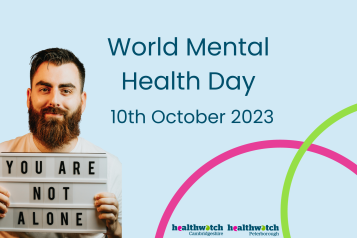Struggling to get help for an eating disorder – Amanda’s story
Amanda has lived with a binge eating disorder for more than 30 years but is currently struggling to get the support she needs. Binge eating disorder (BED) is a serious mental illness where people experience a loss of control and eat large quantities of food on a regular basis.
BEAT, the eating disorder charity, says that, ‘…far from being enjoyable, binges are very distressing. Sufferers find it difficult to stop during a binge even if they want to, and some people with binge eating disorder have described feeling disconnected from what they’re doing during a binge, or even struggling to remember what they’ve eaten afterwards.’
It is as serious as any other eating disorder and it’s important that people with it get treatment as quickly as possible.
Amanda's story
‘I use my binge eating as a way to cope with feeling anxious’, explained Amanda. ‘At first, I didn’t know that I had an eating disorder. It actually started when I was 16, but it wasn’t until my late 20s that someone said it was an eating disorder.’
The problem Amanda faces in getting help is that she doesn’t purge, so isn’t ill enough for support from eating disorder services.
‘If you don’t make yourself sick, then you don’t meet the criteria’, Amanda told us.
Amanda has had psychological support in the past and found this helped her to manage her condition. However, this was 12 years ago, before the birth of her son. Since then, Amanda says that she has, ‘slipped back into my old ways’.
‘It’s affecting my health as I’ve got high blood pressure, I am nearly 20 stone and I’ve had to have my gall bladder out.
My GP says that I am not poorly enough for one service but too poorly for another.
They sent me to a dietician, but I kind of know what I should be eating. It isn’t addressing my mental health issues.
I do worry about my heart. I am finding cannot get up the stairs very well now.
I know anorexia is often seen as more severe, but a binge eating disorder kills you slowly over time.
I used to work and I wanted to have a career, but it has robbed me of my future.’
What our Healthwatch is doing
Eating disorders are complex mental illnesses and anyone, no matter what their age, gender, or background, can develop one. They can be devastating in their impact on individuals and their families.
However, as Amanda’s story shows, it can often take a long time for someone to realise that they have an eating disorder and to ask for help.
We are calling for a rethink in how eating disorder services are provided, including putting in place more support for people at an earlier stage in their illness.
Sandie Smith, our Chief Executive, said,
'There are two different services; there are services for young people and there are services for adults. We think that it would work better if this was all one service.
A lot of eating disorders happen at the exact time when you change from children’s services to adults’ services, so there’s a lot of disruption to your care at a time when you really need it.
Some people are having trouble getting treatment, because the threshold for getting into an eating disorder service is actually quite high.
We feel that there needs to be more in the community to help people at a much earlier stage.’
How you can help improve services
We are talking to Cambridgeshire and Peterborough Clinical Group and the organisations who provide eating disorder services, about our worries.
If you have a recent experience of these or any other mental health support service, please do share it with us. We can pass it onto the people who make decisions about these services in a way that doesn’t identify you. It will help them understand what care is like for you.
You can tell us your story online or contact our friendly team:
Call 0330 355 1285
0752 0635 176 - text only
For more support
- Beat – information on getting support with an eating disorder from BEAT, the UK’s eating disorder charity. Find out more


